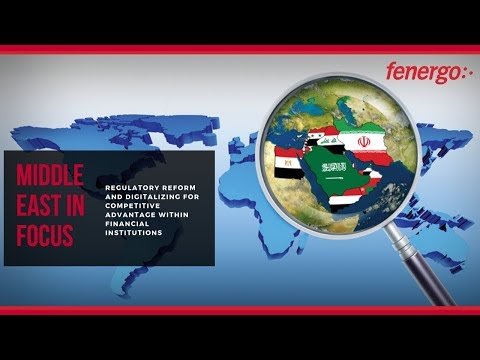Middle East in Focus: A Changing Compliance Landscape
Published by Gbaf News
Posted on September 24, 2018
3 min readLast updated: January 21, 2026

Published by Gbaf News
Posted on September 24, 2018
3 min readLast updated: January 21, 2026

Rachel Woolley
Regulatory Consultant, R&D
Within the last ten years, the global financial market has seen a huge increase in the number of regulations to attempt to introduce more transparency and accountability to financial institutions. This skyrocketing number of regulations leads to more exorbitant compliance budgets, more fines and more scrutiny.
In research published by Fenergo this week, it was found that financial institutions across the world have been fined approximately US$26 billion for anti-money laundering and sanctions-related violations. This research anticipates that the global level of fines will decrease, as we are already seeing. However, the monetary fines may continue to rise for newer regulations such as GDPR and MiFID II.
A Changing Landscape
Over the past several years, there has been significant progress in the development of anti-money laundering (AML) programs in the MENA region, with most financial institutions implementing AML and Counter Terrorist Financing solutions. In 2017, when the onslaught of new and updated regulations started to slow, the Middle East was one of only two regions where compliance spending still increased. Yet despite the evidence of compliance investment in the region, the global reputation of the region remains less than ideal.
US regulators, in particular, are sceptical about the Middle East’s compliance with AML and CTF rules, with the region being perceived as having a ‘lighter touch’ regulatory framework. This is problematic given the importance of international business, especially business with the United States.
As a result, MENA financial institutions have to work harder to fight against this perception by complying with the highest level of standards in addition to other local/global regulatory requirements.
De-risking vs Risk-Based Approach
Due to this global perception of being a ‘lighter touch’ regulatory region, many countries consider the Middle East to be of higher risk for KYC and due diligence purposes, resulting in the automatic classification of clients as higher risk. In some instances, financial institutions are de-risking altogether rather than taking this risk on (an activity which is deeply frowned up on by the FATF). Instead, by deploying a risk-based approach to client classification, financial institutions can determine the correct level of due diligence on a case-by-case basis, enabling them to tap into a wider market. However, they need to be supported with the right technology to do this.
Making Strides Toward Compliance with Technology
It is an interesting point to note that the majority of fines levied against financial institutions by the Dubai Financial Services Authority (DFSA) for AML contraventions were for systems failures rather than actual money laundering offences. This proactive method by the DFSA is further proof of the region’s commitment to compliance. What’s more, 63% of financial institutions in the region expect to make more technology investments over the next two years.
Achieving global compliance standards is hard work and requires constant vigilance. The proactive fines by the DFSA and the level of investment in compliance frameworks and technology in the region shows a definite commitment to compliance. It is important to continue to evaluate on a case-by-case basis rather than judging a region by its reputation.
The next blog in the series will examine some regional difficulties for customer due diligence.
To learn more, download our whitepaper Middle East in Focus: Core Regulatory Challenges in 2018
Explore more articles in the Top Stories category











